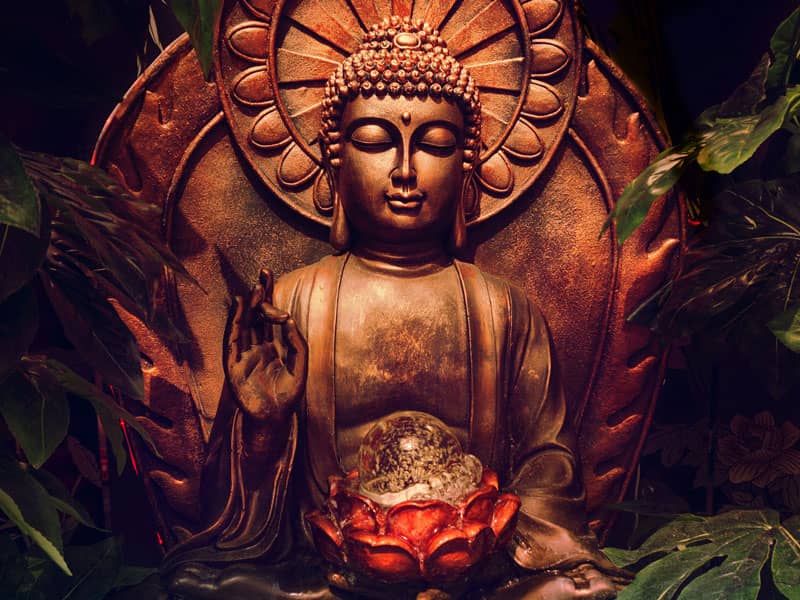A: In chant, the power of sound connects us with ourselves, one another, and the divine. It is an ancient, tried and true form of meditation and prayer. "Chant is singing our prayers; chant is vocal meditation," writes my friend Robert Gass in his fine book, "Chant: Discovering Spirit in Sound." All over the world, people use chants to pray, praise, recite, and contemplate God's innumerable names and sublime qualities. Mechtild of Magdeburg, a 13th-century Catholic lay sister, wrote: "As the Godhead strikes the note, humanity sings. The Holy Spirit is the harpist, and all the strings must sound which are touched by love."
 |
 |
 |
 |
|
| |||
 |
One of the most transformative and nonsectarian spiritual practices, chanting almost immediately takes us out of our heads and beyond the mind, into realms of pure spirit and bliss. It helps us discover the spiritual breath and cosmic energy (prana in Sanskrit) inside the physical breath. Monks and nuns, shamans, yogis, dervishes, chant masters, pilgrims, cantors, singers, and musicians have long known this universal secret. "Chant is the music of the cosmic spheres and the natural expression of higher consciousness," says Don Campbell, musician and author of "The Mozart Effect." Chant is not an obscure ritual--it is the important tool used by people everywhere to heal their bodies, quiet their minds, and bring the sacred into their lives."
|
| |
 |
|
I have had some of my most moving spiritual experiences while chanting for hours at a time, especially on Tibetan Buddhist retreats where we chanted an average of eight to 10 hours a day, and on high holidays, when chanting can go on for as many as 24 hours at a time, seven days in a row (and even more) without stopping. If that does not change your consciousness, nothing will!
Tibetan Buddhism is renowned for the use of mantras, chants, and esoteric liturgies and rituals as an essential part of its tantric meditation and yoga system. In fact, Tibetan Buddhism is more properly known as "Secret Mantra Vajrayana," or the Diamond Vehicle of Secret Mantras. Chanting is used extensively for blessing, worship, communion, and healing, as well as for meditation, concentration, and purification. Mantra meditation can totally transform the atmosphere and effect swift transformation, both internally and externally.
Mantras are words of sacred power, pregnant with meaning and resonance. According to my late teacher, the great Tibetan lama Deshung Rinpoche, the word "mantra" literally means "something to lean the mind/consciousness upon." The Buddha himself said, "Better than a meaningless story of a thousand words is a single word of deep meaning which, when heard, produces peace." The mantra OM is one example of such a word, redolent with peace; when intoned, it naturally lends itself to harmony, oneness, and unity.
|
| |
 |
|
One of my favorite mantras is the mantra of love and compassion, Om Mani Pedmay Hung, which literally means "the jewel is in the lotus" or "the Buddha is within." This is the Dalai Lama's mantra, and the national mantra of Tibet. You can learn how to chant this on my CD, "Chants to Awaken the Buddhist Heart," a collaboration with meditation-music master Steven Halpern as a companion to my book "Awakening the Buddhist Heart."
Mantras can be orally chanted, intoned, or even sung. They can also be repeated mentally to oneself. Secretly, they can be visualized in the inner chakras and energy channels of the "light body" (subtle body), or aid in deep samadhi (meditative absorption). Mantra repetition is classically one of the most surefire methods to train the attention and to learn concentration, focus, and how to calm the mind.
You can easily learn the chants I practice and do them yourself. Don't feel shy or self-conscious--nobody's listening! When I was young, my music teacher used to tell me to stand in the back and mouth the words, because I couldn't sing. But when I was in India and trained in chanting, I felt my throat chakra open, and I lost my self-consciousness. I didn't care what it sounded like, because it was a practice. Sometimes I chant while I walk or drive, or I listen to chant CDs along the way. We all need a little more music in our souls. I never leave home without it.
|
| |
 |
|



